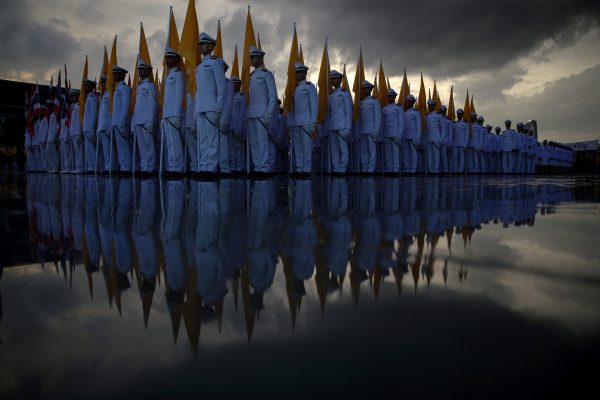Two tasks defined the military junta’s political agenda upon seizing power in 2014. One was to undermine former prime minister Thaksin Shinawatra’s political appeal and crush his electoral machine. A second was to eradicate the anti-monarchism that developed following the 2006 military coup. The junta now seems to be claiming victory on both tasks.
In the past, the junta has repeatedly postponed promised elections, fearing that the pro-Thaksin Pheu Thai Party would do well despite the junta’s election laws and rules that are expressly designed to disadvantage Pheu Thai. This year, the junta seemingly came to the conclusion that it had done enough to derail the pro-Thaksin electoral juggernaut and began preparations for an election on 24 February 2019.
The belief that a ‘victory’ over Pheu Thai is finally possible speaks to the junta’s satisfaction with its efforts to repress red shirts. It also reflects a perception that former Thaksin finance minister Somkid Jatusripitak has successfully developed a pro-junta political party that has convinced former Thaksin politicians to defect to the junta.
Made a member of the junta after the coup, Somkid became Deputy Prime Minister in 2015 and revamped the junta’s failing economic programs by convincing its leadership to adopt Thaksin-esque populist economic policies. With a cabal of former senior pro-Thaksin politicians, Somkid also created the new Palang Pracharat Party that, if electorally successful, will propose that Prayuth continue as prime minister in the next government.
Even if polls suggest otherwise, these developments appear to have given the regime confidence that its parties can triumph over pro-Thaksin parties. Still, the junta is taking no chances, and throughout 2018 it implemented rules and policies to benefit its supporters and hobble Pheu Thai. Commentators are now discounting Pheu Thai’s electoral challenge to the junta.
The junta can also claim victory in its war on anti-monarchism. Following the 2014 coup there was a huge spike in lese majeste prosecutions involving perceived insults to the monarchy. The decline in prosecutions in 2017 and their elimination in 2018 suggests the junta feels that it has successfully controlled anti-monarchism. It may also reflect King Vajiralongkorn’s preference that such cases do not tarnish his reign, at least until his coronation is held.
At the time of Vajiralongkorn’s accession in 2016, several commentators felt that the monarchy was in crisis and that its public profile would decline. Vajiralongkorn was thought unpopular, erratic and self-serving. But his profile was boosted this year by significant palace and junta efforts to promote an image of the king as a benign monarch. This has involved several public events such as traditionalist revivals, a river spectacular and a bike ride. The latter was led by the king, with participants donning free shirts designed by Vajiralongkorn himself.
Related to this campaign, the junta and palace sanctioned the creation of an official royal support group, known as Volunteer Spirit, which reportedly has some four million members. The group claims to have been involved in the rescue of the young soccer players trapped in a cave that made international headlines, and the delivery of relief supplies following the collapse of a dam and subsequent flooding in Laos.
For some, the volunteer group evokes memories of royalist gangs involved in the 1976 massacre at Thammasat University. There is also concern over plans for a quadrupling of the size of the police force that ‘protects’ the monarch, with some seeing this expansion as a return to the monarchy–military relationship associated with multiple coups and political repression over the last several decades.
For his part, the king tried and succeeded to gain more personal control over palace affairs this year. Most significantly, Vajiralongkorn demanded more changes to the legal status of the crown’s US$35–50 billion holdings, making it his personal property and allocating him remarkable powers to determine which assets belong to the crown. He also replaced the long-serving head of the Crown Property Bureau with a trusted military aide and made changes to the Privy Council.
Within Bangkok, the palace consolidated its property in the so-called royal precinct by closing popular sites to the public, substantially expanding the precinct and removing historical markers connected to the 1932 revolution that overthrew the absolute monarchy. All of this has considerably enhanced Vajiralongkorn’s power and influence.
Looking ahead, 2019 may see both an election and a coronation. The junta’s hope is that an election will result in a government that ends military dictatorship but maintains the military’s domination and marks the end of the Thaksin era. If that happens, the junta will likely consider the coronation as a royal endorsement of the military’s political efforts since the 2014 coup.
Kevin Hewison is the Weldon E Thornton Distinguished Emeritus Professor of Asian Studies at the University of North Carolina at Chapel Hill and an Adjunct Professor at the University of Macau.
This article is part of an EAF special feature series on 2018 in review and the year ahead.

